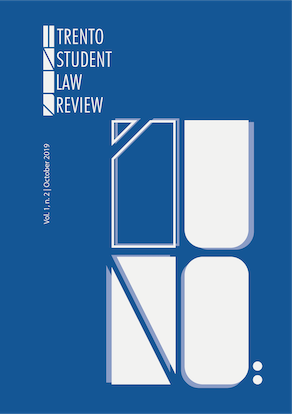The History and Practice of Substantive Due Process: A Question of Legitimacy
DOI:
https://doi.org/10.15168/tslr.v1i2.525Parole chiave:
Due process, Fourteenth Amendment, individual rights, natural rights, Warren CourtAbstract
While the concept of substantive due process can be found in judicial decision-making prior to the Civil War, in the 1960s it became and has remained a lightning rod among the juristic community. Controversy abounds over issues regarding substantive due process ranging from the applicability and reliability of the doctrine to its cogency and legitimacy. Many scholars attribute the skepticism toward the concept of substantive due process to be the result of a paradigm shift in the middle of the 20th century when this concept transitioned from an economic-and-property rights-based approach to one that is dedicated to safeguarding individual liberties. This skepticism is also rooted in concerns about political or legal ideological preferences from the Supreme Court in cases involving individual liberties. Regardless of the genesis of these concerns, any decisions grounded upon substantive due process will likely become the subject of heated controversy. Therefore, it is prudent to explore alternative options that are available to provide a textual anchor for the protection of individual liberties in important civil rights cases. Many legal scholars contend that other options do exist. For example, the Fourteenth Amendment's Privileges or Immunities Clause would, in many cases, permit the Court to reach a verdict equivalent to what would have been possible under substantive due process, but with an additional veneer of legitimacy by cementing the voting public as the locus of power at the expense of further constraining judges. These and other creative alternate approaches may help build consensus in decision making.##submission.downloads##
Pubblicato
Come citare
Fascicolo
Sezione
Licenza
Il diritto d'autore sui testi pubblicati nella Trento Student Law Review resta in capo ai rispettivi titolari. La rivista consente agli autori di mantenere i pieni diritti di pubblicazione.
La Trento Student Law Review è distribuita con una licenza Creative Commons Attribuzione - Non commerciale - Condividi allo stesso modo 4.0 Internazionale (CC BY-NC-SA 4.0).





